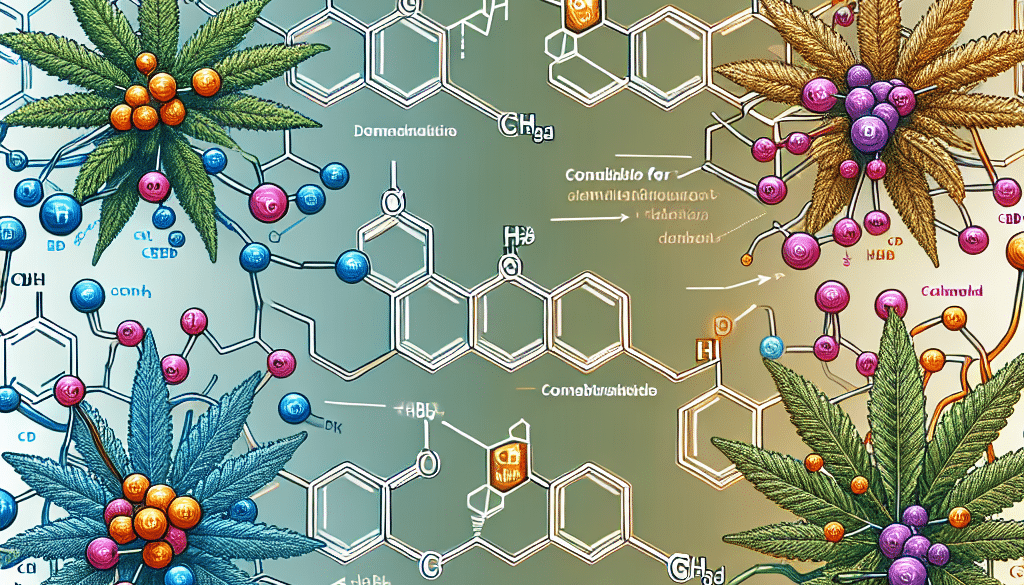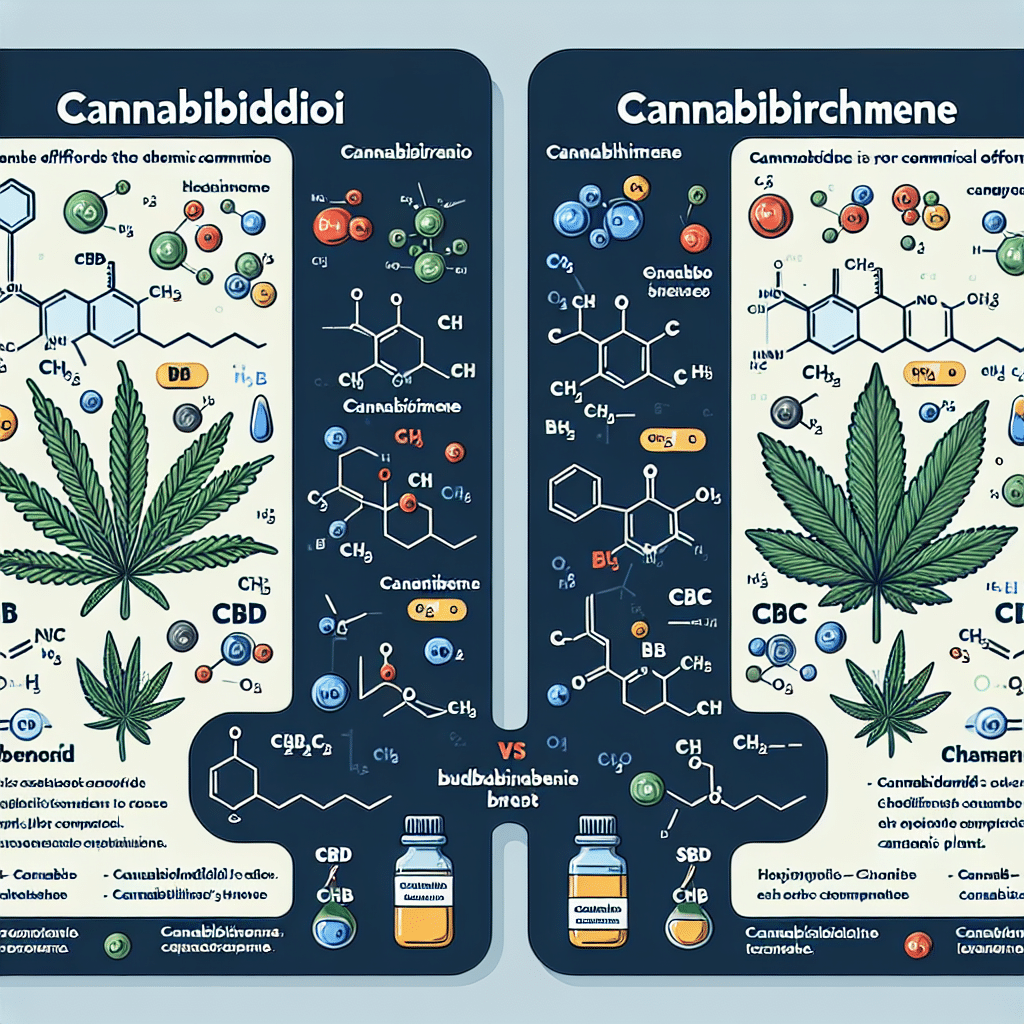What is the Difference Between CBD and CBC?
-
Table of Contents
- CBD vs. CBC: Understanding the Differences and Benefits
- Introduction to Cannabinoids
- What is CBD?
- What is CBC?
- Comparing CBD and CBC
- Benefits of CBD and CBC
- Benefits of CBD
- Benefits of CBC
- Case Studies and Research
- Legal Status and Considerations
- Conclusion: Key Takeaways
- Discover ETChem’s Protein Products
CBD vs. CBC: Understanding the Differences and Benefits
The world of cannabinoids is ever-expanding, with ongoing research revealing more about their potential health benefits. Among the plethora of compounds found in the cannabis plant, CBD (cannabidiol) has gained significant popularity for its therapeutic properties. However, another lesser-known cannabinoid, CBC (cannabichromene), is also emerging as a compound of interest. This article delves into the differences between CBD and CBC, exploring their unique characteristics, benefits, and potential applications.
Introduction to Cannabinoids
Cannabinoids are a class of diverse chemical compounds that act on cannabinoid receptors in cells that alter neurotransmitter release in the brain. The cannabis plant contains over 100 different cannabinoids, with THC (tetrahydrocannabinol) and CBD being the most well-known. These compounds are responsible for the various effects of cannabis, ranging from psychoactive to therapeutic.
What is CBD?
CBD is one of the most researched cannabinoids due to its wide range of potential therapeutic applications. It is non-psychoactive, meaning it does not produce the “high” associated with THC. CBD has been studied for its potential in treating various conditions, including anxiety, pain, inflammation, and epilepsy.
- Anxiety and Depression: CBD has shown promise in reducing anxiety and depression in both human and animal studies.
- Pain Relief: It may help alleviate chronic pain by impacting endocannabinoid receptor activity and reducing inflammation.
- Neuroprotective Properties: CBD’s potential to act on the endocannabinoid system and other brain signaling systems may provide benefits for those with neurological disorders.
What is CBC?
CBC is another non-psychoactive cannabinoid that has been less studied than CBD but is gaining attention for its potential health benefits. While it shares some similarities with CBD, CBC has its own unique properties and potential therapeutic applications.
- Anti-Inflammatory: CBC may contribute to the overall analgesic effects of cannabis, with a particular strength in treating inflammation.
- Neurogenesis: Early research suggests that CBC may promote neurogenesis, the growth and development of nervous tissue.
- Antibacterial and Antifungal: CBC has demonstrated antibacterial and antifungal properties in some studies.
Comparing CBD and CBC
While both CBD and CBC interact with the endocannabinoid system, they do so in different ways and can produce different effects. Here’s a closer look at how these two cannabinoids compare:
- Chemical Structure: CBD and CBC have different molecular structures, which influences how they interact with cannabinoid receptors in the body.
- Psychoactivity: Neither CBD nor CBC is psychoactive, unlike THC, which means they do not produce a high.
- Availability: CBD is more widely available in various forms, including oils, tinctures, edibles, and topicals. CBC is less common but can be found in full-spectrum CBD products.
- Research and Applications: CBD has been more extensively researched and is used for a broader range of health issues compared to CBC.
Benefits of CBD and CBC
Both CBD and CBC have shown potential in various health-related applications. Here are some of the benefits associated with each cannabinoid:
Benefits of CBD
- May reduce symptoms related to mental health disorders such as anxiety and depression.
- Could offer an alternative for individuals with chronic pain and inflammation.
- Potential to alleviate symptoms related to cancer treatments, like nausea and vomiting.
Benefits of CBC
- May support brain health by promoting neurogenesis.
- Could provide anti-inflammatory benefits without the psychoactive effects of THC.
- Possesses antibacterial and antifungal properties that could be useful in treating infections.
Case Studies and Research
Research on cannabinoids is ongoing, with new studies frequently emerging. Some notable case studies and research findings include:
- A study published in the Journal of Pharmacology and Experimental Therapeutics found that CBC showed anti-inflammatory properties in animal models.
- Research in the British Journal of Pharmacology suggests that CBD may have potential as a treatment for neuropsychiatric disorders.
- A review in the European Journal of Pain indicated that CBD could be effective in managing pain and improving sleep without adverse side effects.
Legal Status and Considerations
The legal status of CBD and CBC can vary by country and state. In the United States, the 2018 Farm Bill legalized hemp-derived CBD with less than 0.3% THC on a federal level. However, the legal status of CBC is less clear, and it is essential to check local laws before purchasing or using CBC products.
Conclusion: Key Takeaways
Understanding the differences between CBD and CBC is crucial for consumers and medical professionals alike. While both cannabinoids offer promising health benefits, they have distinct properties and potential uses. CBD is widely recognized and researched, with a range of products available on the market. CBC, though less known, is emerging as a cannabinoid with unique benefits, particularly in the areas of neurogenesis and anti-inflammation.
As research continues to unfold, the full spectrum of benefits offered by cannabinoids like CBD and CBC will become clearer, potentially leading to new therapeutic applications for these natural compounds.
Discover ETChem’s Protein Products
If you’re interested in exploring the benefits of proteins, ETChem’s range of collagen products is an excellent place to start. Their high-quality collagens are perfect for various industries, from nutraceuticals to food and beverage. With a commitment to excellence and customer satisfaction, ETChem is your go-to source for all your protein needs.
About ETChem:
ETChem, a reputable Chinese Collagen factory manufacturer and supplier, is renowned for producing, stocking, exporting, and delivering the highest quality collagens. They include marine collagen, fish collagen, bovine collagen, chicken collagen, type I collagen, type II collagen and type III collagen etc. Their offerings, characterized by a neutral taste, instant solubility attributes, cater to a diverse range of industries. They serve nutraceutical, pharmaceutical, cosmeceutical, veterinary, as well as food and beverage finished product distributors, traders, and manufacturers across Europe, USA, Canada, Australia, Thailand, Japan, Korea, Brazil, and Chile, among others.
ETChem specialization includes exporting and delivering tailor-made collagen powder and finished collagen nutritional supplements. Their extensive product range covers sectors like Food and Beverage, Sports Nutrition, Weight Management, Dietary Supplements, Health and Wellness Products, ensuring comprehensive solutions to meet all your protein needs.
As a trusted company by leading global food and beverage brands and Fortune 500 companies, ETChem reinforces China’s reputation in the global arena. For more information or to sample their products, please contact them and email karen(at)et-chem.com today.





